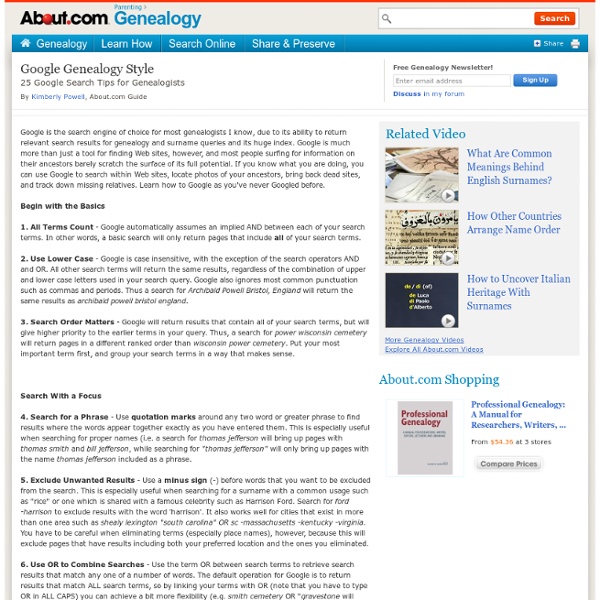Practical Archivist
Let Google help you on your genealogy search
A screenshot of the main Google page. I think one of the things that happens as we begin to get deep into our genealogical research is that we lose sight of the forest for the trees. Our research becomes so detail oriented that we forget that performing the easiest tasks can produce some rewarding results. We get so bogged down in the specialty databases (Ancestry, Fold3, Genealogy Bank, FamilySearch and others) when we’re looking for particular ancestors that we forget the first stop we make when we’re doing a search for anything else: Google. Have you ever done a search for an ancestor on Google? In the late 19th and early 20th centuries, there were many local history books published in the United States, especially New Jersey. If there’s a word you’d like to leave out of any search results, precede it by a hyphen. Use a wildcard: An asterisk to find missing words in a phrase. You can have Google look for synonyms by using the tilde or ~. For more tips, see Google’s operators page.
Footnote
Burial records, cremation records, grave maps, genealogy and ancestry at Deceased Online
RootsWeb.com Home Page
Genealogical Library Master Catalog (p)(f)
Mieux que Google !? Trouvez l'info avec Pearltrees...i love Startups
[Article mis à jour le 21 janvier 2012] La startup Pearltrees a fait beaucoup parler d’elle et se développe à grande vitesse : elle a dépassé la barre des 200 000 inscrits en septembre 2011. Pearltrees devient progressivement incontournable pour effectuer des recherches. Voici dans quels cas l’utiliser et comment. Pour ceux qui ne connaissent pas, Pearltrees permet de rassembler et organiser, sous forme de perle, tous les liens que vous aimez sur le web! ça vous est déjà arrivé d’être déçus par les recherches sur Google? Pour effectuer une recherche, suivez ce lien (pearltrees) puis créez-vous un compte (néanmoins, vous n’êtes pas obligés d’avoir un compte si vous souhaitez uniquement chercher de l’information; je vous conseille tout de même de le faire pour pouvoir collecter vos liens et profiter pleinement de l’outil Par exemple, si vous cherchez des infos sur les « tendances web 2012″, tapez votre recherche dans la barre en haut à droite.
Free Genealogy Resources - Home
How to find family records using the best free Internet resources Bookmark This Site (Ctrl+D) There are literally millions of web pages on genealogy and it is easy to get lost so that you can't see the forest for the trees. Where do you go first? Let's look at the sites that are likely to give you quick and easy results. directly to these sites and find information about your ancestors and relatives. There are two main types of Internet genealogy web sites. Many web sites describe how to do research and provide details of sources of paper and microfilm records. This web site concentrates on online tools and searchable databases of genealogy records so that you can immediately take action to find information online. What are the Steps? I hope you find this useful. 20070613
Genealogy and Family History
How to Begin Most Requested Records What You Can Do Visit Us Library and Archives Canada's Genealogy Services consultation room is located on the 3rd floor at 395 Wellington Street in downtown Ottawa, Ontario. You will find: research tools such as census indexes, atlases, reference books and finding aidscomputers providing access to the Internet, collection catalogue and Library and Archives Canada (LAC) genealogical databases; andfree wireless Internet access. The staff members of the Genealogy Services help users make the most of the LAC collection and provide: the opportunity to consult with a professional;tips and advice on how to conduct genealogical research using different types of records and publications in various formats;help in using research tools;help in consulting specialized genealogical databases;referrals to other special LAC collections Contact Information For your convenience, you may book appointments of up to 30 minutes with a LAC genealogy specialist.
Stephen Porters Talk at SocGen
A genealogical talk on the Records of Jamaica, given during a half -day course, titled "The West Indies", and held at the Society of Genealogists, London, on Saturday, 21 June 1997. By Stephen D. Porter, London NW2 411N. INTRODUCTION Just over 30 years ago, on the 12th February 1966, the late Mr. The lecture was one of a general nature, including a broad sweep of the island's history and record keeping. Jamaica's official written records are comparable in quality to any British records made during the 17th through 20th centuries. There are 2 main locations for Family History researchers in the island and these are concentrated in the south-eastern part, where the Administrative and Financial centres are to be found. Jamaica was divided, from the early days of its recorded history, into Precincts from which Parishes were formed. The 1st period, up to 1705, shows the 17 parishes formed after 50 years of British rule. There is sometimes confusion with the 2 parishes of St.



